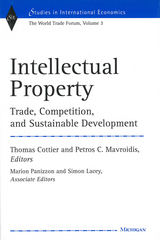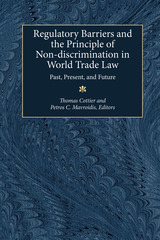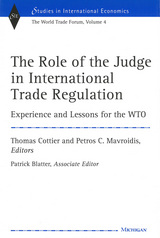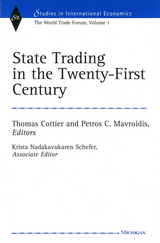5 books about Cottier, Thomas

Intellectual Property
Trade, Competition, and Sustainable Development The World Trade Forum, Volume 3
Thomas Cottier and Petros C. Mavroidis, Editors
University of Michigan Press, 2003
The incorporation of intellectual property protection into the WTO international trading system has been a milestone in international economic law and has added a new dimension to trade regulation — new rights and obligations and new challenges alike. The contributors, leading scholars and practitioners in the field, provide insights into the legal relationship of the TRIPs Agreement to the GATT 94 and the GATS. The book widens the debate with a thorough discussion on pending and unresolved relations of TRIPs, the WTO, UPOV, the Convention on Biodiversity and Farmers' Rights contained in the FAO International Undertaking, and efforts of the World Bank GCIAR system, including IPGRI. What will be the impact of TRIPs on ownership of plant genetic resources?
Largely a victory for OECD countries, the present state of intellectual property rights has important implications for developing countries. The incorporation of intellectual property rights into the WTO system will eventually change the relationship of trade, competition, and intellectual property. It will equally have to assist in providing equitable sharing of benefits in the use of plant genetic resources. All of these issues are essential for the revision of exclusions from patenting in TRIPs. This volume offers insights into how this difficult task could and should be approached in a balanced manner and will be essential reading for economists and trade and intellectual property lawyers interested in the subject. Moreover, the volume will be relevant to agricultural economists as it addresses complex problems in the interstices of trade, intellectual property, plant genetic resources, and sustainable development.
Thomas Cottier is Professor of European and International Economic Law, University of Bern, and Managing Director, World Trade Institute, University of Bern.
Petros C. Mavroidis is Professor of Law, University of Neuchâtel. He formerly worked in the Legal Affairs Division of the World Trade Organization.
Marion Panizzon is Research Fellow, University of Bern.
Simon Lacey is Research Fellow, University of Bern.
Largely a victory for OECD countries, the present state of intellectual property rights has important implications for developing countries. The incorporation of intellectual property rights into the WTO system will eventually change the relationship of trade, competition, and intellectual property. It will equally have to assist in providing equitable sharing of benefits in the use of plant genetic resources. All of these issues are essential for the revision of exclusions from patenting in TRIPs. This volume offers insights into how this difficult task could and should be approached in a balanced manner and will be essential reading for economists and trade and intellectual property lawyers interested in the subject. Moreover, the volume will be relevant to agricultural economists as it addresses complex problems in the interstices of trade, intellectual property, plant genetic resources, and sustainable development.
Thomas Cottier is Professor of European and International Economic Law, University of Bern, and Managing Director, World Trade Institute, University of Bern.
Petros C. Mavroidis is Professor of Law, University of Neuchâtel. He formerly worked in the Legal Affairs Division of the World Trade Organization.
Marion Panizzon is Research Fellow, University of Bern.
Simon Lacey is Research Fellow, University of Bern.
[more]

International Trade and Human Rights
Foundations and Conceptual Issues (World Trade Forum, Volume 5)
Frederick M. Abbott, Christine Breining-Kaufmann and Thomas Cottier, Editors
University of Michigan Press, 2005
The World Trade Forum 2001 on Trade and Human Rights addressed some of the most controversial and challenging issues in the ongoing public debate on globalization: the relationship between institutions and norms regulating global economic activity and institutions and norms promoting and protecting human rights. Presenting a selection of the papers discussed at the Forum, this volume focuses on a significant, developing area of international law certain to become increasingly important in the years to come, as both scholarship and jurisprudence continue to explore the boundaries of the intersection of the two fields. With a diverse array of contributors, International Trade and Human Rights addresses the relationship between human rights and international trade from a unique and important interdisciplinary perspective.
The missing link between the international trade regime and human rights has become one of the key concerns of critics of the WTO. The World Trade Forum 2001 at the World Trade Institute in Berne provided a unique framework for considering the manifold issues relevant to this topic. This book goes beyond listing the different arguments in favor of or against globalization and offers recommendations to the international community for possible reforms so as to better account for the human rights interests affected by the process of globalization.
Frederick M. Abbott is the Edward Ball Eminent Scholar Professor of International Law at Florida State University College of Law. He is the editor of China in the World Trading System: Defining the Principles of Engagement (1998) and author of The International Intellectual Property System: Commentary and Materials (with Thomas Cottier and Francis Gurry, 1999).
Christine Breining-Kaufmann is Professor of Law at the University of Zurich and Senior Research Fellow as well as a member of the Board of the World Trade Institute in Berne. Her publications include Hunger als Rechtsproblem: Völkerrechtliche Aspekte eines Rechtes auf Nahrung (1991) and Globalization and Labour Rights: The Conflicting Relationship between Core Labour Rights and International Economic Institutions (2006).
Thomas Cottier is Managing Director of the World Trade Institute and Professor of Law at the University of Berne. He has co-edited the previous four volumes of the World Trade Forum series.
The missing link between the international trade regime and human rights has become one of the key concerns of critics of the WTO. The World Trade Forum 2001 at the World Trade Institute in Berne provided a unique framework for considering the manifold issues relevant to this topic. This book goes beyond listing the different arguments in favor of or against globalization and offers recommendations to the international community for possible reforms so as to better account for the human rights interests affected by the process of globalization.
Frederick M. Abbott is the Edward Ball Eminent Scholar Professor of International Law at Florida State University College of Law. He is the editor of China in the World Trading System: Defining the Principles of Engagement (1998) and author of The International Intellectual Property System: Commentary and Materials (with Thomas Cottier and Francis Gurry, 1999).
Christine Breining-Kaufmann is Professor of Law at the University of Zurich and Senior Research Fellow as well as a member of the Board of the World Trade Institute in Berne. Her publications include Hunger als Rechtsproblem: Völkerrechtliche Aspekte eines Rechtes auf Nahrung (1991) and Globalization and Labour Rights: The Conflicting Relationship between Core Labour Rights and International Economic Institutions (2006).
Thomas Cottier is Managing Director of the World Trade Institute and Professor of Law at the University of Berne. He has co-edited the previous four volumes of the World Trade Forum series.
[more]

Regulatory Barriers and the Principle of Non-discrimination in World Trade Law
Past, Present, and Future
Thomas Cottier and Petros C. Mavroidis, Editors
University of Michigan Press, 2000
The University of Michigan Press is pleased to announce the second volume in an annual series, the World Trade Forum. The Forum's members include scholars, lawyers, and government and business practitioners working in the area of international trade, law, and policy. They meet annually to discuss integration issues in international economic relations, focusing on a new theme each year.
The World Trade Forum 1998 deals with the issue of regulatory barriers. Contributors focus their attention on the implications that government intervention has on the principle of nondiscrimination, the cornerstone of the World Trade Organization. The chapters, which cover both the positive and the normative level, deal in particular with the issue of "like product" definition, and with mutual recognition agreements. The relevant WTO case law is presented and analyzed, and the roundtable discussions are primarily aimed at clarifying to what extent a constitutional function should be assigned to the WTO organs, if at all.
Contributors include: Christoph Bail, Jacques Bourgeois, Marco Bronckers, Thomas Cottier, William Davey, Paul Demaret, Piet Eeckhout, Crawford Falconer, Olivier Guillod, Meinhard Hilf, Gary Horlick, Robert Howse, Robert Hudec, Patrick Low, Aaditya Mattoo, Petros C. Mavroidis, Patrick Messerlin, Damien Neven, Kalypso Nicolaidis, David Palmeter, Ernst Ulrich Petresmann, Andre Sapir, and Michel Waelbroeck.
Thomas Cottier is Professor of Law, Institute of European and International Economic Law, University of Bern Law School. Petros C. Mavroidis is Professor of Law, University of Neuchâtel.
[more]

The Role of the Judge in International Trade Regulation
Experience and Lessons for the WTO
Thomas Cottier and Petros C. Mavroidis, Editors
University of Michigan Press, 2003
The WTO is generally seen as a key actor of globalization and, as such, has been the point of convergence of popular irritation worldwide. Many of the reproaches addressed to the WTO show civil societys concern with what is perceived as a democratic deficit in the way the organization operates. The main fear is to see trade rise as the ultimate value, prevailing over concerns such as health and environment. The Role of the Judge offers insight into how disputes are solved at the WTO level, into how the judicial branch interacts with the rest of the organization, and into the degree of sensitivity of the system to external input. The book sheds light on the judicial system governing the WTO and shows it to be the only truly multilateral system where disputes are solved by third-party adjudication.
The book develops along three lines: the first a search for cases submitted to the WTO where the judge exceeded its authority; the second a comparison of the WTO with the operations of national judicial systems having different levels of integration, specifically the United States (federal level) and the EC (quasi-federal level); and the third an exploration of directions for the future of dispute settlement in the WTO.
Reflecting the diversity of its contributors, this book addresses questions of economics, political science, and law, bringing an unusual level of multidisciplinarity to this topic and context. It is designed for both academic readers and practitioners, who will find it full of practical insights as well as rich and detailed analysis.
Thomas Cottier is Professor of European and International Economic Law, University of Bern, and Managing Director, World Trade Institute, University of Bern.
Petros C. Mavroidis is Professor of Law, University of Neuchâtel. He formerly worked in the Legal Affairs Division of the World Trade Organization.
Patrick Blatter is Mavroidiss scientific collaborator.
The book develops along three lines: the first a search for cases submitted to the WTO where the judge exceeded its authority; the second a comparison of the WTO with the operations of national judicial systems having different levels of integration, specifically the United States (federal level) and the EC (quasi-federal level); and the third an exploration of directions for the future of dispute settlement in the WTO.
Reflecting the diversity of its contributors, this book addresses questions of economics, political science, and law, bringing an unusual level of multidisciplinarity to this topic and context. It is designed for both academic readers and practitioners, who will find it full of practical insights as well as rich and detailed analysis.
Thomas Cottier is Professor of European and International Economic Law, University of Bern, and Managing Director, World Trade Institute, University of Bern.
Petros C. Mavroidis is Professor of Law, University of Neuchâtel. He formerly worked in the Legal Affairs Division of the World Trade Organization.
Patrick Blatter is Mavroidiss scientific collaborator.
[more]

State Trading in the Twenty-First Century
The World Trade Forum, Volume 1
Thomas Cottier and Petros C. Mavroidis, Editors
University of Michigan Press, 1998
The University of Michigan Press is pleased to announce the first volume in an annual series, The World Trade Forum. The Forum's members include scholars, lawyers, and government and business practitioners working in the area of international trade, law, and policy. They meet annually and discuss integration issues in international economic relations, focusing on a new theme each year.
The central topic of the first World Trade Forum is state trading. To what extent has trade liberalization, as we have experienced it over the last fifty years, affected property ownership? Contributors to the 1998 World Trade Forum explore this question, examining both state practice and the regulatory framework. Their discussions are divided into three parts: Part 1 looks at the World Trade Organization's legal framework for state trading enterprises, taking on such issues as monopolies and state enterprises, the WTO Antidumping Agreement and the economies in transition, and relationship of state trading and the Government Purchasing Act. Part 2 deals with regional experiences in state trading (for the EC, United States, Canada, Japan, China, and Russia). Part 3 examines conceptual issues such as auctions as a trade policy instrument and rule-making alternatives for entities with exclusive rights. The conclusion synthesizes the foregoing chapters in discussing the reach of modern international trade law.
Contributors are Frederick Abbott, Ichiro Araki, Christian Bach, Jacques H. J. Bourgeois, Thomas Cottier, William J. Davey, Vladimir Dbrentsov, Toni Haniotis, Bernard M. Hoekman, Gary Horlick, Henrik Horn, Robert Howse, Patrick Low, Will Martin, Mitsuo Matsushita, Petros Mavroidis, Aaditya Mattoo, Patrick Messerlin, Constantine Michalopoulos, Kristin Heim Mowry, Stilpon Nestor, Damien Neven, N. David Palmeter, Ernst-Ulrich Petersmann, André Sapir, Diane P. Wood, and Werner Zdouc.
Petros Mavroidis is Professor of Law, University of Neuchatel. Thomas Cottier is Professor of Law, Institute of European and International Economic Law, University of Bern Law School.
[more]
READERS
Browse our collection.
PUBLISHERS
See BiblioVault's publisher services.
STUDENT SERVICES
Files for college accessibility offices.
UChicago Accessibility Resources
home | accessibility | search | about | contact us
BiblioVault ® 2001 - 2024
The University of Chicago Press









